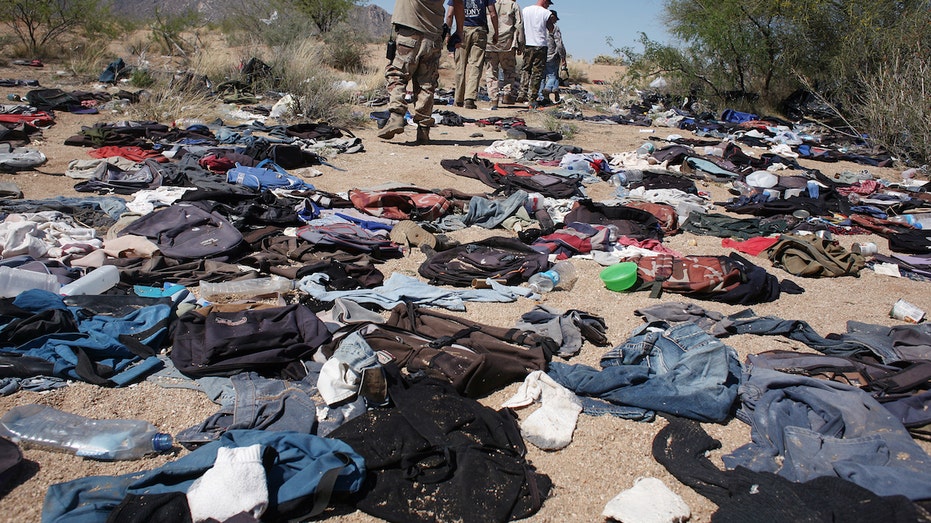The expiration of Title 42, a Trump-era policy that makes it easier to expel migrants, could lead to a marked uptick in environmental degradation along the U.S.-Mexico border, according to immigration experts.
According to the experts, Title 42’s expiration, slated to occur at midnight Thursday, could lead to a surge in illegal crossings along the nation’s southern border even as U.S. authorities already face an unprecedented number of encounters. Much of the migrant foot traffic, though, could take place in federal and state wildlife refuges, potentially threatening sensitive ecosystems.
“In the short term, you’re talking about trash everywhere and damage to the physical environment of the border,” Mark Krikorian, the executive direct of Center for Immigration Studies, told Fox News Digital in an interview.
“Before they put up the fencing in Arizona, and this probably still happens, there were smugglers driving vehicles over the border, smashing down 200-year-old saguaro cactuses. It was serious stuff,” he continued. “I went along with a trash collection team from the Tohono O’odham reservation in Arizona, a huge reservation down there, and there was garbage everywhere.”
BIDEN ADMIN’S PLAN FOR MASS RELEASE OF MIGRANTS INTO US OUTLINED IN INTERNAL 2022 MEMO
Overall, about 40% of the land along the 2,000-mile U.S.-Mexico border is federally-managed. Those federal lands include protected national wildlife refuges (NWR), national monuments and national forests such as the Cleveland National Forest in California; Buenos Aires NWR and Organ Pipe National Monument in Arizona; and Big Bend National Park and Lower Rio Grande Valley NWR in Texas.
Mitch Ellis, the current chief of the U.S. Fish and Wildlife Service’s Division of Natural Resources, testified during a congressional hearing while he was the Buenos Aires NWR manager in the mid-2000s that remote federally-managed wildlife zones “remote areas have also become prime habitat for smugglers, undocumented migrants, and other illegal border crossers.”
BORDER PATROL APPREHENDS OVER 10,000 MIGRANTS A DAY AHEAD OF TITLE 42’S END, HIGHEST EVER RECORDED
“We would love to direct more of our efforts at Buenos Aires to managing natural resources, instead of managing border issues and damage. But the current situation will not allow for that,” Ellis said. “In fact, the situation at Buenos Aires is not unique. My fellow land managers along the border are all facing similar challenges and dealing with the issues in much the same manner.”
He also noted that hundreds of tons of trash and hundreds of vehicles were abandoned each year due to illegal border crossings in Buenos Aires NWR. Such activity also leads to illegal roads and trails, human waste, and wildfires on federal lands.
In Arizona alone, roughly 2,000 tons of trash are discarded every year along the state’s borderlands, state data showed. High levels of border crossings have forced both the Arizona Department of Environmental Quality and Texas Commission on Environmental Quality to spearhead wast collection, water quality protection and air quality protection programs.
“You’ve got all these smuggling routes that go through these national parks,” Jeremy Beck, the vice president of NumbersUSA, said in an interview. “The way these smuggling operations work, they’re not there to be ecologically conscious. They’re bringing people across and they’re dumping stuff as they need to.”
“Well-intentioned groups, perhaps misguided but well-intentioned groups, go out there and leave water bottles and water jugs and things like that to help migrants along the smuggling route,” Beck added. “That stuff all gets discarded. Sensitive ecosystems get trampled over. It’s just traffic.”
BORDER PATROL CLEARS WAY FOR MORE MIGRANT RELEASES TO CITY STREETS, SOURCES SAY
In addition, an internal GOP House Natural Resources Subcommittee on Federal Lands memo from March shared with Fox News Digital highlighted that illegal marijuana growing operations are often set up on federal lands along the southern border.
Citing various media reports, the memo stated cleaning up such sites is an “arduous and costly process” since they involve graded dirt, trash, propane tanks, toxic chemicals, human waste, garbage, rat poison and moldering food scraps that get abandoned. It costs taxpayers about $40,000 for authorities to clean up such sites.
In one example, U.S. Forest Service agents busted an illegal cultivation site worth $1.2 million in the Cleveland National Forest, removing about a ton and a half of trash, more than a mile of irrigation piping, 1,110 pounds of fertilizer and bottles of banned pesticide chemicals, NBC News reported in 2021.
“Our border resources are already stretched past the breaking point, and the Title 42 expiration will dramatically exacerbate the issues,” House Natural Resources Committee Chairman Bruce Westerman, R-Ark., told Fox News Digital. “With nearly 40% of the southern border lying along federal lands, many of America’s sensitive habitats and wildlife populations are at risk of destruction.”
“I’ve personally traveled to the border and seen the trash and environmental degradation that is compounded by every illegal immigrant that passes through,” he added. “The Biden administration and Secretary Mayorkas are asleep at the wheel while America sits in the backseat.”
“We need to take immediate action to secure our border, provide agencies with the necessary resources, and ensure these vast stretches of federal land are protected.”
Krikorian and Beck, who both argue for stricter border security policies to curtail illegal immigration, also argued that increased migration will broadly lead to increased greenhouse gas emissions.
“Long term, people don’t come to America to not live like Americans,” Beck said. “That’s why people are coming here. And most of these people, as we know, are economic migrants who are, of course, seeking to improve their economic opportunity. Nobody really can blame them for that. But that economic opportunity creates additional consumption. The impact is really enormous.”
The FWS and Customs and Border Protection both declined to comment.
























